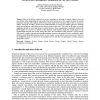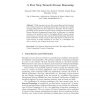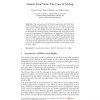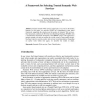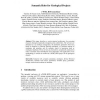147
Voted
ICPW
2007
15 years 4 months ago
2007
The key objective of communal knowledge sharing at the scale of the World Wide Web is the ability to collaborate and integrate within and between communities. Ontologies, being fo...
108
Voted
ICPW
2007
15 years 4 months ago
2007
As more courseware becomes available, choosing the right functionality for a particular e-learning community is becoming more problematic. Systematic methods for evaluating course...
89
Voted
FIS
2008
15 years 4 months ago
2008
This paper presents a model-based photo registration system for the creation and visualization of environmental content. We utilize freely available Digital Terrain Models of the p...
142
Voted
FIS
2008
15 years 4 months ago
2008
Most of the efforts conducted on services nowadays are focusing on aspects related to data and control flow, often disregarding the main goal of the future Internet of services, na...
117
Voted
FIS
2008
15 years 4 months ago
2008
While reasoners are year after year scaling up in the classical, time invariant domain of ontological knowledge, reasoning upon rapidly changing information has been neglected or f...
FIS
2008
15 years 4 months ago
2008
Today's economy is a service economy, and an increasing number of services is electronic, i.e. can be ordered and provisioned online. Examples include Internet access, email a...
103
click to vote
FIS
2008
15 years 4 months ago
2008
The business model of Web2.0 applications like FaceBook, Flickr, YouTube and their likes is based on an asymmetry: Users generate content, Web2.0 application providers own, (i), th...
110
Voted
FIS
2008
15 years 4 months ago
2008
Abstract. Despite its technological success story, the Internet is facing a rampant growth of isolated ontologies and a massive dump of unstructured legacy data. Therefore, archite...
101
Voted
FIS
2008
15 years 4 months ago
2008
Trusted semantic Web services might play a key role in the Future Internet. In this paper, we describe WSTO our comprehensive trust based framework supporting the selection and inv...
138
Voted
ESWS
2008
Springer
15 years 4 months ago
2008
Springer
This paper describes a service-oriented architecture for accessing resources through semantically designed portals called hubs. The services are dedicated to: (a) ontology manageme...


